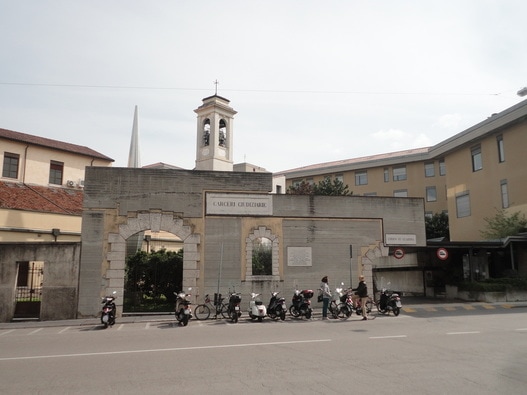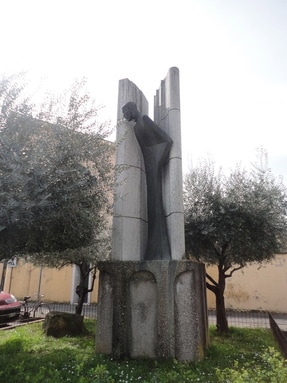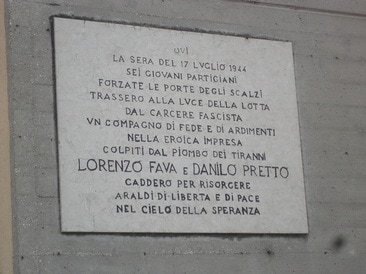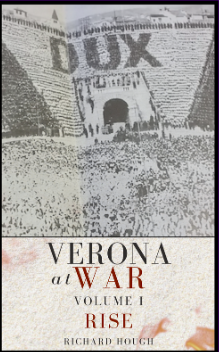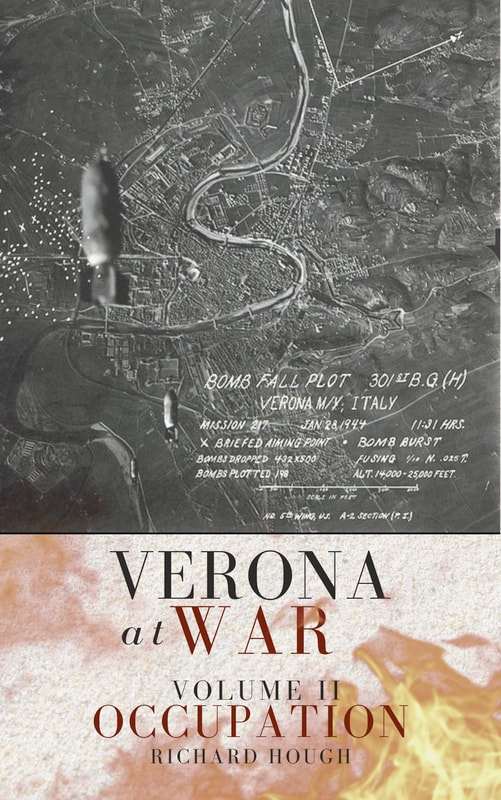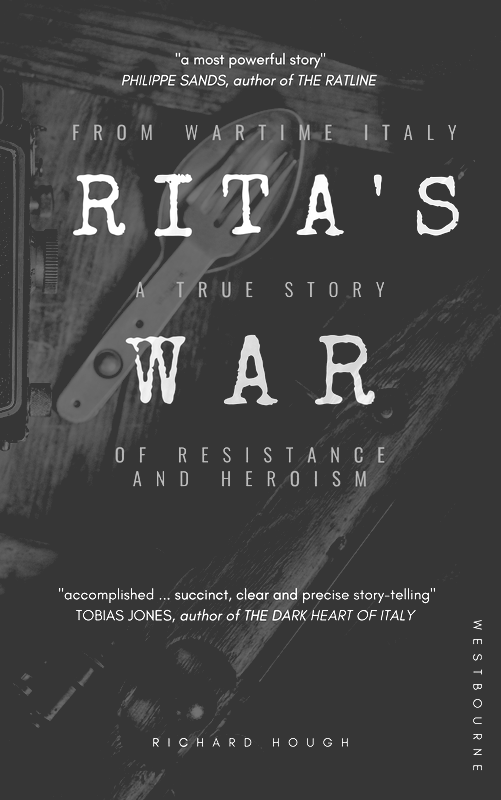|
After an afternoon's teaching, I find myself on via Scalzi waiting for the number 24 bus to take me home. Via Scalzi is a non-descript street in a non-descript part of central Verona, somewhere between Castelvecchio and the train station. Across the road from the bus stop, peering out from behind some olive trees, is a curious looking statue of a rather sad looking man. To my left, behind a row of scooters, the ugly facade of what might once have been a prison wall. Near this spot at around 9.00 am on Tuesday 11 January 1944, Count Galeazzo Ciano, Mussolini’s confidant, emissary and heir apparent, alongside five other senior fascists accused of betraying il Duce, was tied to a chair and shot in the back. His defiant last words: "Long live Italy!" The dashing son of an Italian war hero, a one-time journalist and skillful diplomat, Count Ciano had served in Rio de Janeiro, Peking and the Holy See. His marriage on 24 April 1930 gave his career new impetus. First he was appointed Consul General of Shanghai, then Minister to China. In August 1933 he became Mussolini’s chief press officer. In September 1933 his office was upgraded and renamed the Office of Press and Propaganda. In June 1935 the office becomes a government ministry and Ciano its Minister. On 9 June 1936, at the age of just 33, Ciano was appointed Minister of Foreign Affairs. His wife is Edda Mussolini, eldest child of Benito Mussolini, Italy's fascist dictator. Ciano serves as Italian Foreign Minister during a remarkably volatile period of European and international history. It is a period that witnesses the Italian invasion of Ethiopia, intervention in the Spanish Civil War, ideological alignment and subsequent military alliance with Nazi Germany and the outbreak of the Second World War. During this period, Ciano is a key figure in the international political and diplomatic scene, playing a central role in Italy's decision to invade Albania (1939) and Greece (1940), as well as in Axis partnership negotiations with Hitler and von Ribbentrop. But Ciano, always suspicious of Germany, disagrees with Mussolini’s continuing partnership with Hitler. He joins with other high-ranking fascists plotting to remove Mussolini from office. Harbouring ambitions to play a leading part in a new peacetime government, Ciano has kept a diary throughout this period. He believes it “will be sufficient not only to protect me from all political vengeance and persecution, but will rehabilitate me even in the eyes of my adversaries”. In July 1943, the Gran Consiglio del Fascismo, the highest organ of the fascist state, votes 17 to 7 in favour of Mussolini's dismissal. Ciano is one of the 17 who votes against Mussolini. Although he is arrested the following day, Mussolini is subsequently liberated by the Germans and declared head of the Republic of Salò, the puppet state established on the banks of Lake Garda. For the traitors, the only possible punishment is death. Understanding the danger he is in, Ciano tries unsuccessfully to obtain a passport so that he and his family can seek exile in Spain. The passports don't materialise and he is subsequently placed under house arrest in Germany. Fearing for his personal safety, he plans an alternative escape route, using his diaries (which are known to be of great political and historical value) to buy his freedom. In October 1943, he is extradited back to Italy and, when the plane lands at Verona, he is immediately arrested. A sham court is established in Verona to investigate and try those who had voted against Mussolini. Ciano and the other captured conspirators are transferred to the the prison on via Scalzi. In December 1943, the trial, il Processo di Verona, begins. Edda makes an emotional appeal to her father on behalf of her husband but, despite strong words and tears, il Duce refuses to intervene on behalf of his son-in-land. Realizing his fate is sealed, Ciano prepares three documents; the first, a preface to his diaries (which he has arranged to be published after his death); the second, a letter to King Victor Emmanuel III; and the third, a letter to Prime Minister Winston Churchill. A rather elaborate escape plan is hatched involving an unlikely cast of characters which includes a Nazi officials, Gestapo agents and a prototype femme fatale, the beautiful wife of a Luftwaffe officer. At the last moment Hitler himself intervenes and the escape plan is foiled. With staggering bravado Edda then attempts to sescure her husband’s release by threatening not only General Harster, but also Mussolini and Hitler. In a letter delivered to each, she threatens to publish the diaries if Ciano is not freed. Her threats are in vain and all but one of the conspirators are condemned to death. The night before his execution, Ciano is at first refused holy communion and confession. Permission is finally granted and Don Chiot, the prison chaplain, performs the religious rites. Meanwhile, Edda somehow makes it across the border to neutral Switzerland with the diaries, the SS in hot pursuit. Early on Wednesday morning in January 1944, the fascist conspirators are led out of prison. They are hurriedly shot by a cack-handed firing squad who make a complete mess of the execution. Back in via Scalzi little remains of the prison where Ciano lived out his last few hours. The only clue to the building's dark past is a plaque which marks the site of a subsequent partisan attack (see Escape from Scalzi).
Across the street, peering out from behind the olive trees, the statue of Don Chiot, the prison chaplain who witnessed the execution, says nothing of the events he witnessed here over 70 years ago. There is no mention of the diplomat turned traitor, Count Galeazzo Ciano, Mussolini's son-in-law. As the number 24 bus trundles down the hill and I climb on board, pleased to be heading home. Postscript Ciano’s diaries were published in January 1946. They have been described as “unquestionably, incomparably, the most interesting and important Italian memoir material regarding World War II” (The Ciano Papers: Rose Garden, CIA Historical Review Program Release, Howard, McGaw Smyth). For those with an interest in these events, Mussolini and I is a four-part docu-drama based on Ciano’s diaries, starring a youthful Anthony Hopkins in the role of Ciano. |
AboutRichard Hough writes about history, football, wine, whisky, culture + travel and is currently working on a trilogy about wartime Verona.
|
